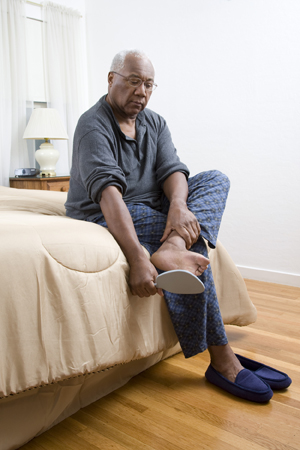Treating Peripheral Neuropathy: Foot Care
Peripheral neuropathy is a disease of the nerves. It most often starts in your feet. Over time, it may also affect the arms. It may cause pain or may make you unable to have normal pain sensation. Sometimes, weakness occurs, too. Lack of normal pain sensation and weakness may make you more likely to hurt yourself without knowing it.
Learn ways to protect your feet. Check your feet daily for wounds you may not have felt. Prevent burns by testing bath water with your elbow before stepping in. Also, always wear shoes to prevent injury.
Regular foot care
If you have foot numbness, you may not notice cutting yourself while trimming your nails. To prevent problems, your healthcare provider may ask you to visit for nail and callus trimming. See your provider for foot care as often as advised. Don't use a heating pad on your feet if you have peripheral neuropathy. It can burn your skin without you feeling it.
Check your feet daily
Catch problems early by checking your feet each day for changes. Look at the top and bottom of your feet. Check your heels and between your toes. It may help to use a mirror. If this is hard, ask someone to check for you. Call your provider if you see a wound, ulceration, ingrown nail, or any changes in your feet. This includes increased heat, swelling, numbness, tingling, pain, and redness.

Wear correct footwear
Always wear shoes and socks, even indoors. Ask your healthcare provider how to choose the right shoe. After buying shoes, bring them to your provider to be checked for correct fit. Take new shoes off every hour or so to check for red pressure areas on your feet. Each time you put on your shoes, use your fingers first to feel inside for foreign objects.
Common causes of peripheral neuropathy
Some common causes of peripheral neuropathy include:
-
Diabetes or other endocrine disorders
-
Toxins (such as alcohol)
-
Nutritional deficiencies (such as vitamin B-12)
-
Kidney disease
-
Injury
-
Repetitive stress (such as carpal tunnel syndrome)
-
Autoimmune disease
-
Cancer and tumors
-
Chemotherapy
-
Arthritis
-
Being older
-
Hereditary
-
Infection
Diagnosis and treatment
Diagnosis of peripheral neuropathy includes a complete history and physical exam. Lab tests, including blood work and imaging, often help find the cause. Special nerve tests often help. These include nerve conduction velocity studies (NCV) and electromyography (EMG).
Treatment focuses on treating the underlying problem and symptoms. This may include: